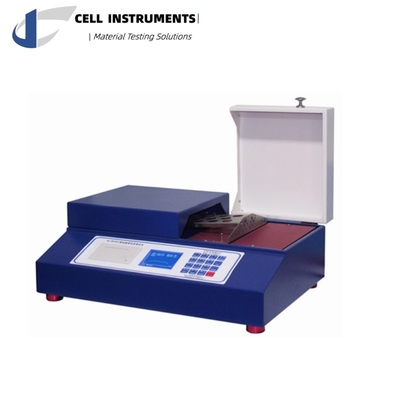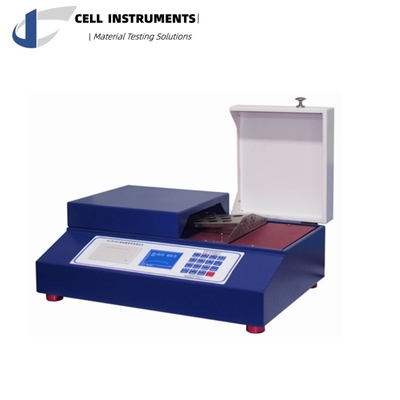Fabric Softness Testing Instrument For Textile Fabric Stiffness Testing Machine

Contact me for free samples and coupons.
WhatsApp:0086 18588475571
Wechat: 0086 18588475571
Skype: sales10@aixton.com
If you have any concern, we provide 24-hour online help.
x| Test Range | (10~1000) MN | Test Blade Size | R. Mm, 120mm*2mm L*D |
|---|---|---|---|
| Blade Stroke | 8±0.5mm | Test Speed | 1.2mm/s |
| Force Resolution | 1mN | Accuracy | ±1% |
| Slot Width | 5mm, 6.35mm, 10mm, 20mm | Power | AC 220V 50Hz |
Fabric Softness Testing Instrument For Textile Fabric Stiffness Testing Machine
![]()
| RRD-01 | |
| Test Range | (10~1000) mN |
| Test Blade Size | R. mm, 120mm*2mm L*D |
| Blade Stroke | 8±0.5mm |
| Test Speed | 1.2mm/s |
| Force Resolution | 1mN |
| Accuracy | ±1% |
| Slot Width | 5mm, 6.35mm, 10mm, 20mm |
| Power | AC 220V 50Hz |
Fabric Softness Testing Instrument for Textile and Non-Woven Materials
Introduction to the Fabric Softness Testing Instrument
The Fabric Softness Testing Instrument (RRD-01 Softness Tester) is a state-of-the-art device designed to accurately measure the softness or stiffness of various materials, including fabrics, non-woven textiles, paper, and tissue. This advanced instrument evaluates the physical properties of end products or semi-finished products, ensuring that manufacturers maintain stringent quality control over the texture and softness of their materials.
With a growing demand for high-quality, soft-touch materials across industries like packaging, food, pharmaceuticals, and textiles, having a reliable Fabric Softness Testing Instrument is crucial for ensuring the desired texture and flexibility of materials. This instrument is widely used in laboratories and quality inspection departments, ensuring consistent performance and high accuracy in softness testing.
Working Principle of the Fabric Softness Testing Instrument
The Fabric Softness Testing Instrument operates based on the blade/slot method, a widely recognized technique for softness testing in textiles and related industries. The procedure involves placing a fabric sample on a slot (a gap between two flat plates). A force is applied to the sample through a penetrating blade, which pushes the fabric into the slot at a fixed depth of 8mm. The resistance encountered by the blade as it pushes the sample through the slot is recorded as the softness value.
This innovative design ensures that measurements are taken with high precision, eliminating the risk of subjective human errors. By automating the process, the Fabric Softness Testing Instrument provides consistent and repeatable results, ensuring that quality standards are consistently met in manufacturing processes.
Key Features of the Fabric Softness Testing Instrument
-
Automated Testing: The RRD-01 Softness Tester automates the testing process, allowing users to achieve accurate results quickly and effortlessly. This removes the inconsistencies caused by manual testing and human subjectivity.
-
Wide Testing Range: With a force testing range of 10 to 1000 mN, the instrument can handle a variety of materials, from ultra-soft tissues to stiffer non-woven fabrics, ensuring versatility in application.
-
High Precision: The force resolution of 1mN ensures that even minute differences in fabric stiffness are captured, making this device ideal for sensitive applications like pharmaceutical packaging or high-end textiles.
-
Adjustable Test Parameters: Users can customize testing parameters such as slot width, test blade size, and speed to match specific testing needs. This flexibility allows for accurate testing of different material types.
-
Enhanced Durability: Built with high-quality materials, the RRD-01 is durable and designed for long-term use in laboratory and industrial environments.
-
User-Friendly Operation: With its simple interface and easy-to-understand operation, users can quickly learn to operate the device, making it ideal for labs that require rapid testing without extensive training.
Applications of the Fabric Softness Testing Instrument
The Fabric Softness Testing Instrument is versatile, with applications spanning a wide range of industries. These include:
-
Textile and Fabric Testing: Ensuring the softness or stiffness of fabrics used in clothing, upholstery, and industrial textiles.
-
Non-Woven Materials: Testing the softness of non-woven fabrics used in hygiene products, medical textiles, and automotive interiors.
-
Packaging Materials: Evaluating the stiffness of packaging materials, including tissues, films, and paper, to ensure they meet the required standards for softness.
-
Pharmaceuticals: Ensuring the texture and softness of pharmaceutical packaging materials like blister packs and syringes.
-
Tissue and Paper Products: Testing the softness of tissues, napkins, and other paper-based products used in personal hygiene and household goods.
Technical Specifications
- Test Range: 10 to 1000 mN
- Blade Size: R. mm, 120mm2mm (LD)
- Blade Stroke: 8±0.5mm
- Test Speed: 1.2mm/s
- Force Resolution: 1mN
- Accuracy: ±1%
- Slot Width: 5mm, 6.35mm, 10mm, 20mm
- Power Supply: AC 220V 50Hz
Standards Compliance
The Fabric Softness Testing Instrument complies with a wide range of international standards, making it suitable for global operations. These standards include:
- GB/T 8942: Paper-Determination of Softness
- ASTM D2923: Test Method for Rigidity of Polyolefin Film and Sheeting
- QB/T 1060: Softness Tester
- TAPPI T498: Softness of Sanitary Tissues
- ASTM D6828-02: Stiffness of Fabric by Blade/Slot Procedure
- INDA IST 90.3, EDANA WSP 90.3: Test standards for non-woven materials
Advantages of the Fabric Softness Testing Instrument
- Enhanced Accuracy: The high-precision design ensures the utmost accuracy, helping manufacturers meet strict quality requirements for fabric softness.
- Broad Material Compatibility: This instrument is compatible with a wide variety of materials, from soft, delicate tissues to stiffer fabrics used in industrial applications.
- User Efficiency: The automated process allows for high throughput in laboratories, reducing testing time and improving overall productivity.
- Standardized Compliance: With adherence to global standards, the Fabric Softness Testing Instrument is ideal for companies looking to expand their operations or meet international regulations.
- Cost-Effective: By automating the testing process and reducing manual labor, this instrument lowers operational costs and improves the efficiency of laboratory operations.
Why Choose the RRD-01 Fabric Softness Testing Instrument?
The RRD-01 is the ultimate solution for manufacturers, quality control labs, and research institutions requiring precise softness testing. Its advanced technology ensures consistency, repeatability, and compliance with industry standards. Whether you're working with packaging materials, non-woven fabrics, or textiles, this instrument provides accurate results that can inform product development, quality assurance, and regulatory compliance.
Additional Features
- Compact Design: Fits easily into any laboratory or production space.
- Real-Time Data: Provides immediate test results, which can be analyzed for improved decision-making.
- Customizable Settings: Adjust slot width, speed, and other parameters to suit your testing requirements.
- Durability: Built to last, with low maintenance requirements, ensuring years of reliable service.




